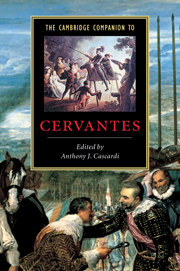Book contents
- Frontmatter
- 1 Introduction
- 2 The historical and social context
- 3 Cervantes and the Italian Renaissance
- 4 Don Quixote and the invention of the novel
- 5 The influence of Cervantes
- 6 Cervantes’ other fiction
- 7 Writings for the stage
- 8 Humor and violence in Cervantes
- 9 Psyche and gender in Cervantes
- 10 Cervantes and the New World
- Appendix: electronic editions and scholarly resources
- Index
- Series List
7 - Writings for the stage
Published online by Cambridge University Press: 28 May 2006
- Frontmatter
- 1 Introduction
- 2 The historical and social context
- 3 Cervantes and the Italian Renaissance
- 4 Don Quixote and the invention of the novel
- 5 The influence of Cervantes
- 6 Cervantes’ other fiction
- 7 Writings for the stage
- 8 Humor and violence in Cervantes
- 9 Psyche and gender in Cervantes
- 10 Cervantes and the New World
- Appendix: electronic editions and scholarly resources
- Index
- Series List
Summary
Known above all for his great masterpiece of prose fiction, Cervantes himself aspired perhaps more than anything to success as a playwright and a poet. In late sixteenth- and seventeenth-century Spain, drama and poetry were the two connected areas of artistic endeavor which dominated literary output and in which literary reputations were made. The sixteenth century had seen the rise of prose fiction but, although fiction yielded the century's bestsellers in the domain of the secular, the status of imaginative writing in prose was still uncertain in that it lacked the authority of the classics. One of Cervantes' chief concerns in his prose works was to adapt classical prescriptions for poetry - creative as opposed to factual writing - to the new genre, but the ultimate accolade he sought, the respect and admiration of the literary establishment, was still fully accessible only through the traditional channels. Cervantes' trouble was that in his intellectual conviction early on that poetry and drama must continue to observe the classical precepts, he was slow to understand that the new commercial theatre being pioneered by Spain's first great dramatist Félix Lope de Vega Carpio, which abandoned the constraints of neoclassical theory, could contrive to combine popularity with art. In chapter 48 of the Quixote the priest and the canon pour scorn on the contemporary theatre and the way it has sacrificed art to profit, and on the evidence of his Viaje del Parnaso (Voyage to Parnassus, 1614) Cervantes never lost his misgivings about Lope de Vega's popularizing, anticlassical influence on poetic activity in Spain.
- Type
- Chapter
- Information
- The Cambridge Companion to Cervantes , pp. 131 - 159Publisher: Cambridge University PressPrint publication year: 2002
- 6
- Cited by



